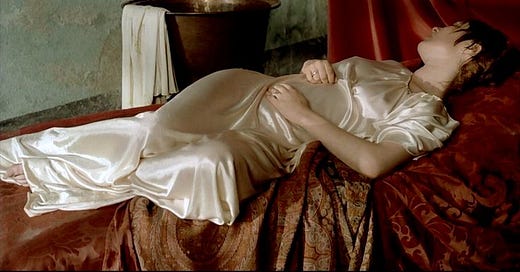You are a devil now because you had first been an angel
The Marquise of O- by Heinrich von Kleist
Maybe The Marquise of O just isn't the kind of story most of us are used to. Heinrich von Kleist’s style of narration may at first prove a bit difficult for a reader not willing to endure through the beginning passages. As I started out, the story felt a little too bland, until when I was finally(finally!) reading the last sentence, and then, it dawned on me that that last statement was worth the whole story. It suddenly got me seriously thinking about what I had just read, and made me pay attention to a story that had all along been beautiful and powerful, yet I had insisted on reading it so disinterestedly.
It felt as though I had shut my heart and that last statement broke the lock and got me to start noticing things. If you do indeed read the novella, I am not sure if you will have the same experience, for when it comes to stories, our personal tastes, moods, attitudes, and particular bent of mind at the time we are doing the reading either make us enjoy a book, or want to toss it aside for the next episode of Game of Thrones. But if anything, Alan Jacobs has taught me not to be guilty about putting a book down, and maybe picking it up later, or not. He says:1
The better we know ourselves the better we will be able to make some of the decisions that all readers must face—for instance, and notably, the decision to persist in reading a book that fails to delight. […] if this particular book is not giving me pleasure now, it may give me pleasure later, if I allow it to do so. Maybe it’s just starting slowly but will pick up speed; maybe I haven’t fully grasped the idiom it’s working in but eventually will figure it out; maybe the problem is not with the book but with my own powers of concentration because I slept fitfully last night. Or maybe, for some reason I don’t understand, today is not one of the High Holidays of my spirit. […] , I needed to learn, as I eventually did, that if I set a book aside today I am not thereby forbidding myself to return to it later—nor am I promising to do so.
Yet for all its apparent ‘blandness’ Kleist’s The Marquise of O- isn’t a particularly comfortable read, with the very first lines suggesting the eccentricity of the tale about to unfold before us. A woman is pregnant. She doesn’t know who’s responsible. She announces in the papers that the father of her child show himself.
How does a woman not know how she got pregnant? Was she raped? No she wasn’t. Or was she? I was sure about my feelings concerning rape until I was halfway through the Marquise of O-.
When the Marquise declares her willingness to marry the father of her child if he were to reveal himself, which Count F- does, why doesn’t she embrace and kiss him? It turns out there’s isn’t anything beautiful about being raped by a Count, even one who had just rescued you from a gang rape.
The Marquise had loved the Count, after he had gallantly rescued her from the brutes, but as soon as she realized he was the father of her child, she no longer wants anything to do with this devil. But hadn’t he been her angel until then? The last sentence: she answered that she would not have seen a devil in him then if she had not seen an angel in him at their first meeting.
Lesson?
It isn’t those we don’t know but those we do who are able to hurt us more effectively. Before we saw the devil in them, it’s striking how we had at first seen an angel. What are you to do when the person you trusted is the one who pushes the knife into your heart? How indeed can kind men suddenly turn out to be so unkind? The blade of such a betrayal usually cuts deep into the recesses of our souls. Maybe because our idea and conception of trust is suddenly put up to trial, and it wobbles precariously.
How do you mean we never saw through the mask? Are we so naïve to be so easily fooled by appearances? We are made to confront the truth about ourselves; how gullible and undiscerning we are. We come out of such ordeals scarred, believing we have learnt our lessons, until it happens again.
But we ourselves barely know or understand the darkness in us, how then are we to figure out other people’s? Most times, those who we adore aren’t truly and completely known to us, understandably so, for men are quite ungraspable beings. And, as it has been posited, love and reason don’t keep the same company.
Maybe in the end to really trust someone, to deeply love them, to be completely and sincerely vulnerable with them, maybe it really is to confess: I am ready to be hurt by you. I am okay to be betrayed by you. I am willing to be killed by you. Chances are one of those things will happen. No sooner had Hulga removed her wooden leg, than Pointer took off with it.2 It’s the one who has said ‘I love you’ before who will break your heart. What’s the other option?
Love no one. Trust no one. Protect yourself. Care for nothing. There’s a word for it: cynicism. Yet if we would be human beings, we find our gazes turned to C. S. Lewis’s words:3
To love at all is to be vulnerable. Love anything, and your heart will certainly be wrung and possibly be broken. If you want to make sure of keeping it intact, you must give your heart to no one, not even to an animal. Wrap it carefully round with hobbies and little luxuries; avoid all entanglements; lock it up safe in the casket or coffin of your selfishness. But in that casket—safe, dark, motionless, airless—it will change. It will not be broken; it will become unbreakable, impenetrable, irredeemable.
Find what you love and let it kill you. Let it drain you of your all. Let it cling onto your back and weigh you down into eventual nothingness. Let it kill you and let it devour your remains. For all things will kill you, both slowly and fastly, but it's much better to be killed by a lover. - Charles Bukowski
I recommend you read The Marquise of O by Heinrich von Kleist.
Whatever virtues the novel might have, they are connected to the limitations you mention
To an impatient and domineering editor and publisher, Flannery O'Connor, insisting upon the path and form she willed her novel to take, wrote back: Whatever virtues the novel might have, they are connected to the limitations you mention.
The Pleasures of Reading in an Age of Distraction by Alan Jacobs
Good Country People by Flannery O’Connor
The Four Loves by C. S. Lewis







"Those we adore are not fully known to us...., To love is to be vulnerable"😔